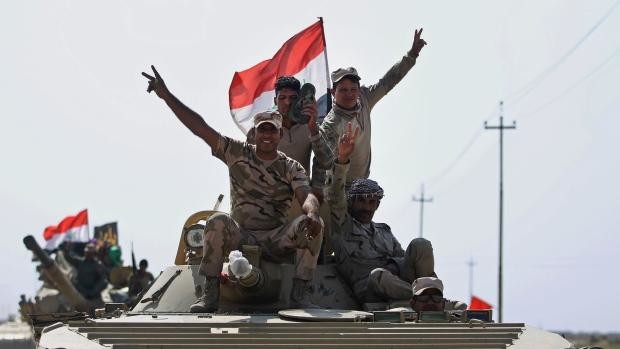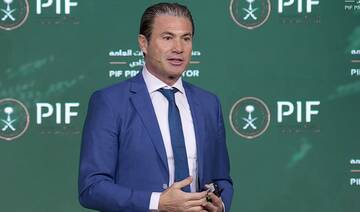KIRKUK, Iraq: Iraqi forces clashed with Kurdish fighters Monday near the disputed city of Kirkuk, seizing a key military base and other territory in a major operation sparked by a controversial independence referendum.
The offensive, which follows weeks of soaring tensions between two US allies in the battle against the Daesh group, aims to retake oil fields and military bases that Kurdish forces seized during the fightback against the jihadists.
Iraqi and Kurdish peshmerga forces exchanged artillery fire early Monday south of Kirkuk, the capital of the oil-rich province, after the launch of the operation overnight.
In a major advance, Iraq's Joint Operations Command said central government forces took control of the K1 military base northwest of the city -- the first objective of the offensive -- following the withdrawal of peshmerga fighters.
They also seized bridges, roads and an industrial zone to the southwest of Kirkuk, as well as gas facilities, a power station, a refinery and a police station, it said.
The clashes follow an armed standoff between Kurdish forces and the Iraqi army prompted by the September 25 non-binding referendum that produced a resounding "yes" for independence for the autonomous Kurdish region of northern Iraq.
Baghdad has declared the referendum -- held despite international opposition -- illegal.
Crisis talks on Sunday had made little headway in resolving the standoff, which has raised fears of fresh chaos just as Daesh jihadists are on the verge of losing their last strongholds in the country.
State television announced that government troops had taken "large areas" of the province from Kurdish forces "without fighting".
Military sources on both sides however reported exchange of Katyusha rocket fire to the south of the provincial capital.
Iraqi Prime Minister Haider al-Abadi, who said this week that he was "not going... to make war on our Kurdish citizens", has "given orders to armed forces to take over security in Kirkuk," state television said.
Iraqi troops will "secure bases and government facilities in Kirkuk province" the government said.
Multiple peshmerga fighters were injured in the clashes and hospitalised in Kirkuk, a local security source said.
Abadi said that members of the Hashed al-Shaabi, the paramilitary Popular Mobilisation forces, which are dominated by Iran-backed Shiite militias, would stay away from Kirkuk, where there have been multiple demonstrations against their involvement in the dispute.
An AFP photographer saw columns of Iraqi troops heading towards Kirkuk from the south.
Two people were killed in artillery exchanges at Tuz Khurmatu, 75 kilometres south of Kirkuk, a doctor at a city hospital said.
On Sunday, Iraq's National Security Council said it viewed as a "declaration of war" the presence of "fighters not belonging to the regular security forces in Kirkuk", including fighters from Turkey's outlawed Kurdistan Workers' Party (PKK).
For their part the Iraqi forces have said that they have no wish to enter Kirkuk but that they wish to retake military positions and infrastructure which were under their control before their troops withdrew in the face of hostility from the jihadists.
On the fringes of the town, they used loudspeakers to call on the peshmerga to give up their positions, local sources said.
Long claimed by the Kurds as part of their historic territory, the province has emerged as the main flashpoint in the dispute.
Polling during the referendum was held not only in the three provinces of the autonomous Kurdish region but also in adjacent Kurdish-held areas, including Kirkuk, that are claimed by both Baghdad and Iraqi Kurdistan.
The Kurds control the city of Kirkuk and three major oil fields in the province that produce some 250,000 barrels per day, accounting for 40 percent of Iraqi Kurdistan's oil exports.
The fields would provide crucial revenue to Baghdad, which has been left cash-strapped from the global fall in oil prices and three years of battle against Daesh. Iraq is also demanding the return of a military base and a nearby airport, according to the Kurds.
Iraqi forces seize territory from Kurds in independence dispute
Iraqi forces seize territory from Kurds in independence dispute

PIF’s Humain invests $3bn in Elon Musk’s xAI prior to SpaceX acquisition

JEDDAH: Humain, an artificial intelligence company owned by Saudi Arabia’s Public Investment Fund, invested $3 billion in Elon Musk’s xAI shortly before the startup was acquired by SpaceX.
As part of xAI’s Series E round, Humain acquired a significant minority stake in the company, which was subsequently converted into shares of SpaceX, according to a press release.
The transaction reflects PIF’s broader push to position Saudi Arabia as a central hub in the global AI ecosystem, as part of its Vision 2030 diversification strategy.
Through Humain, the fund is seeking to combine capital deployment with infrastructure buildout, partnerships with leading technology firms, and domestic capacity development to reduce reliance on oil revenues and expand into advanced industries.
The $3 billion commitment offers potential for long-term capital gains while reinforcing the company’s role as a strategic, scaled investor in transformative technologies.
CEO Tareq Amin said: “This investment reflects Humain’s conviction in transformational AI and our ability to deploy meaningful capital behind exceptional opportunities where long-term vision, technical excellence, and execution converge, xAI’s trajectory, further strengthened by its acquisition by SpaceX, one of the largest technology mergers on record, represents the kind of high-impact platform we seek to support with significant capital.”
The deal builds on a large-scale collaboration announced in November at the US-Saudi Investment Forum, where Humain and xAI committed to developing over 500 megawatts of next-generation AI data center and computing infrastructure, alongside deploying xAI’s “Grok” models in the Kingdom.
In a post on his X handle, Amin said: “I’m proud to share that Humain has invested $3 billion into xAI’s Series E round, just prior to its historic acquisition by SpaceX. Through this transaction, Humain became a significant minority shareholder in xAI.”
He added: “The investment builds on our previously announced 500MW AI infrastructure partnership with xAI in Saudi Arabia, reinforcing Humain’s role as both a strategic development partner and a scaled global investor in frontier AI.”
He noted that xAI’s trajectory, further strengthened by SpaceX’s acquisition, exemplifies the high-impact platforms Humain aims to support through strategic investments.
Earlier in February, SpaceX completed the acquisition of xAI, reflecting Elon Musk’s strategy to integrate AI with space exploration.
The combined entity, valued at $1.25 trillion, aims to build a vertically integrated innovation ecosystem spanning AI, space launch technology, and satellite internet, as well as direct-to-device communications and real-time information platforms, according to Bloomberg.
Humain, founded in August, consolidates Saudi Arabia’s AI initiatives under a single entity. From the outset, its vision has extended beyond domestic markets, participating across the global AI value chain from infrastructure to applications.
The company represents a strategic initiative by PIF to diversify the Kingdom’s economy and reduce oil dependence by investing in knowledge-based and advanced technologies.











